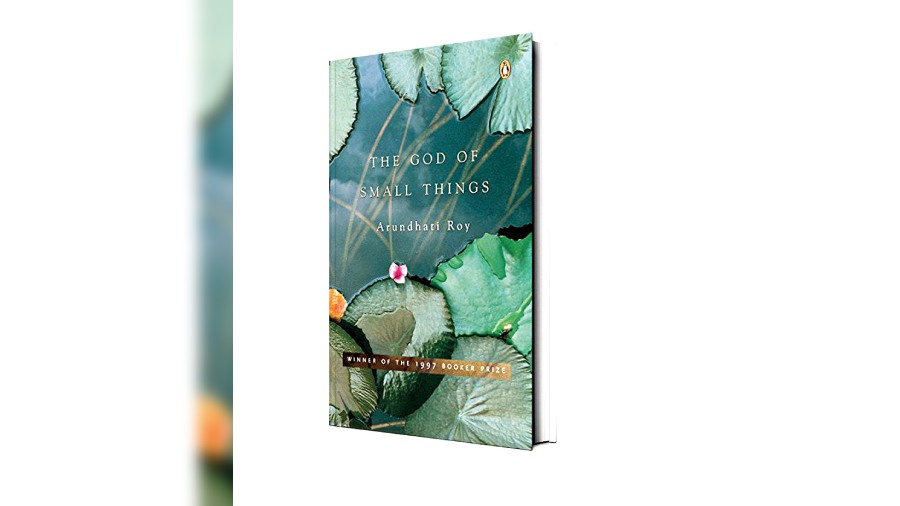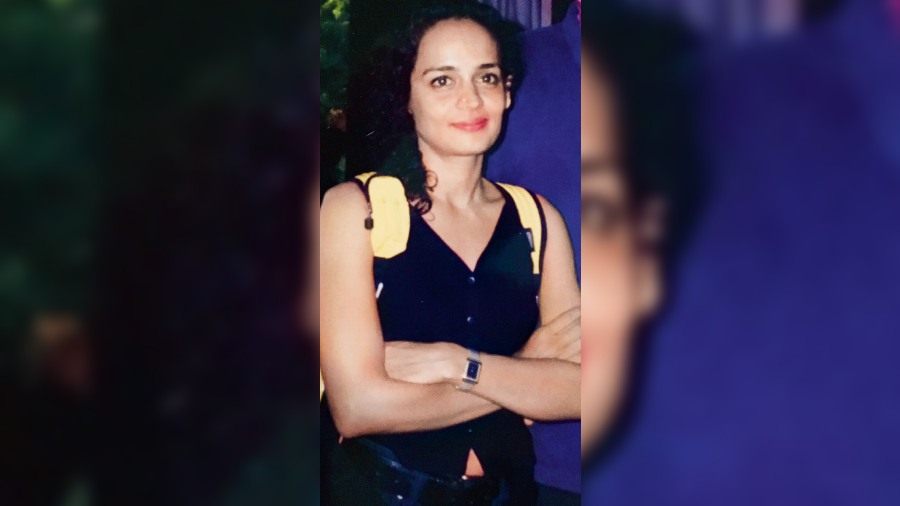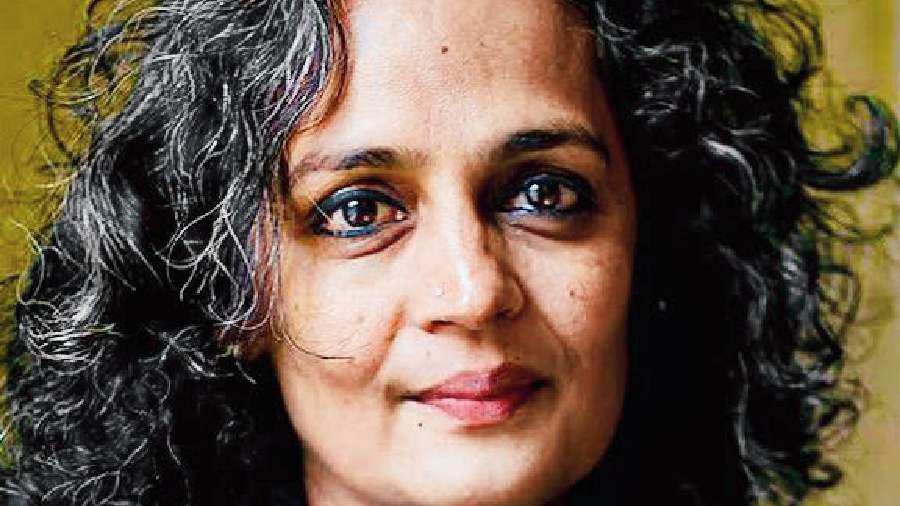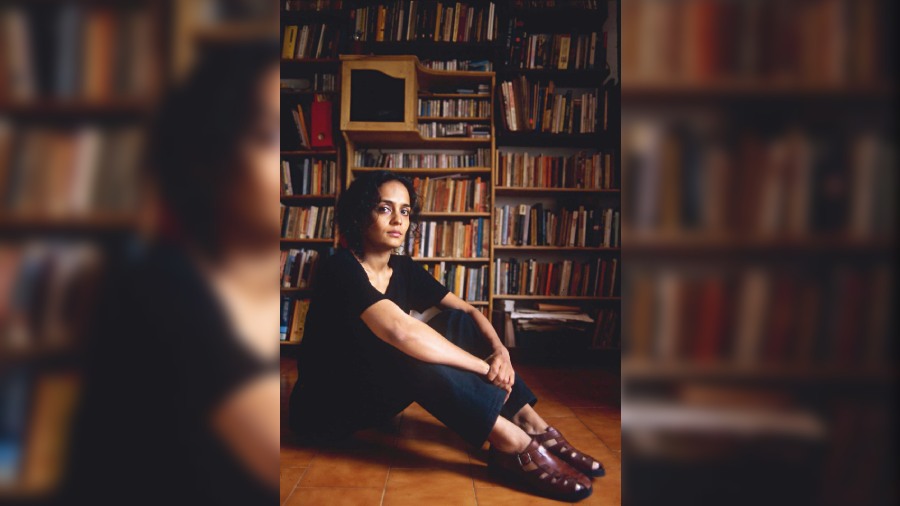Booker Prize winner, architect, screenwriter, champion of the marginalised with an abiding commitment to justice and an irreverent sense of the comic, one of India’s greatest literary exports, a trapeze artist between linguascapes, Arundhati Roy has much to celebrate as her Booker Prize-winning novel turns a proud 25 this year.
On a balmy tropical evening, when the world seemed to have gone dizzy with the first Indian woman winning the Booker Prize for The God of Small Things, 38-year-old writer Arundhati Roy held an audience spellbound in the historic Tanglin Club in Singapore. Trendy in a spaghetti-strap top and ebony jeans and sporting a bow tie, borrowed from my partner Harish Mehta, on her sculpted clavicles, the petite dynamo took the stage to a resounding welcome.
Roy’s unruly curls framed her chiselled face. She was the distinguished speaker hosted by the Tanglin Club of which I was the chair of the library sub-committee, and by the Indian Women’s Association, of which I was founder president. As I launched our conversation, her irreverent sense of humour and straight talking won over the standing-room-only audience immediately. As I invited her to give us a brief talk to open the floor, her answer was signature Roy: “I am not a politician, so I won’t make speeches,” she said, point blank. And the crowd applauded.
So I took the Q & A route after briefly introducing her. To my question ‘So what is The God of Small Things?’, she said: “To me the book is about connecting the very smallest things to the very biggest things. From the dent a spider makes on the surface of water to the two children’s childhoods, to politics to history to geological time — that’s the connection where you see how history intrudes into your personal life. It’s not something that doesn’t concern you. It’s something that you are part of, you create yourself as you go along.”In the course of the few memorable days spent in her company as our guest of the Tanglin Club, she was refreshingly honest and had an innocence about her that was endearing and left a strong impression on me.
What does she think about the public face that the writer is forced to encounter, I asked. “I think the writer Toni Morrison said that writing is a very private experience made for public consumption. It is the schizophrenia of a writer. I would be a complete hypocrite if I said that I wrote this for private purposes, that I didn’t want it published. I did write it very privately and it is about very private things, but somehow it is necessary for those things to be public, and there is a part of me that enjoys that.”
Now when I read my Singapore 1998 diary with the date 27 February circled with “Booker Roy Event” boldly written on the page, I see the quote I scribbled on the margins of that page and I marvel at this diminutive tour de force, who eats like a sparrow but sports the heart of a lioness. We were standing at Singapore’s Changi Airport. I had gone to see her off after the event. She hardly reached the check-in counter for Business Class, flying on to the Adelaide Literary Festival.
Within two minutes, with her boarding card in hand and a big beamer on her face, she said to me: “You know all this is so new to me. I never thought I would have so much money one day. When I wrote the book, money was the last thing on my mind. I would have been thrilled to have a publisher and £300 would have been a surprise.”
Unlike the many authors who forget their battles and paint over the wounds with their prize money and royalties, the magnificent thing about Arundhati Roy seems to be her courage to keep those scars in view, so she remembers the ones who struggle to survive, every day. Her discursive continuum with fiction and non-fiction that followed after The God of Small Things — The Algebra of Infinite Justice, The Ministry of Utmost Happiness, Azadi and more — are forged in the fire of a deep-rooted concern for the embattled fringes.
The River Meenachil: Re-reading the currents
There is a new reading of The God of Small Things through the lens of the River Meenachil, which is a powerful current that was neglected initially but has now gradually moved to centre stage as more young readers, keenly concerned about the environment, read the river as a powerful character in this novel.
Arundhati Roy employs several subversive strategies in The God of Small Things, set in the waterscape of the ferocious River Meenachil, the abode of the river Goddess Meenakshi. The first destabilises the purity of language — it is as if the Meenachil embraces so many different tongues that Roy herself is also the repository of — Malayalam, English, Hindi, Bagania, a patois she picked up when she was an infant in Shillong, Meghalaya, and its environs. The second dismantles a highly organised caste structure in a postcolonial state. And the third resurrects the subtle though pervasive presence of the myth of the river Goddess Meenachil as a warrior by conflating her with the resistance to conformity exhibited by Ammu, the main character of the novel and mother of the twins, Rahel and Estha.

Cover of The God of Small Things
So the steely resolve and quiet activism of Ammu, in selecting Paravan Velutha, a Dalit, as a surrogate father for her children, is considered a direct affront by a cruel and nihilistic patriarchy. This strategy also conflates the Dalit community, of which Velutha is a valorous representative, and the river becomes a trope for the indomitable, unstoppable force of the marginalised speaking back to the centre. To write about the River Meenachil then, is to go to the heart of what could be the power of the fringes against the monolithic, masculinist, and treacherous patriarchy that dominates women and Dalits in our culture.
What is it about growing up in Kerala that produces this fascinating river of language, I had asked Arundhati Roy when I met her after her Booker win. Was there something in her childhood that created this story? “There must have been. But I could only say yes for sure if I had two childhoods and I could compare them. But I only have one. The thing about Kerala is that it is where the world’s big religions live together — and not always happily. You have Christianity, Hinduism, Islam and Marxism. It is such a fantastic backdrop in front of which human drama unfolds and what is revealed is the human beings’ basic nature. It’s a great workshop to watch things in.”
Located in the watery landscape of Kerala, and chronologically divided between the 1960s and the 1990s, Roy charts her plotline in The God of Small Things along a fine trajectory that follows a broader historical frame. I posit that by highlighting the embedded historical irony of Kerala’s identity as the Indian state with the highest rate of literacy, a Communist state (where gender equality is presumed to be a given) and a largely Christian one (where caste barriers are supposed to be obliterated by massive conversions of the lower castes and higher ones by the Syrian Christian Church), the author systematically deconstructs the myths of an egalitarian society. Roy pointed out: “For me, I grew up in this village called Ayemenem and as a child spent hours by the river catching fish from the age of three. And I think those hours of silence, of not having adults or television and people ushering your thoughts in a particular direction really helped. You learn to hold your peace as a child.”
The trauma of subaltern dispossession takes on an ineluctable significance for India’s southern Marxist state that has the highest literacy rate, and carries the burden of a vexed colonial history of religious conversions to Christianity and deeply embedded social hierarchies of caste. Writers such as Roy, who venture into this territory both as storyteller and activist, must negotiate a form of cross-cultural interaction that is burdened with a highly charged symbolism — in this case the River Meenachil is the transformative trope that evolves into a dangerous force, killing the child Sophie Mol.
First though, before embarking on an exploration of the subversions of either language or caste, it is crucial to establish the River Meenachil’s power as an unstable space, as intimated by Velutha’s brother Kuttappen —where the twins have some of the happiest experiences of their childhood and their most horrific one with Sophie Mol’s drowning.

The writer at a young age
The metaphor of the boat on the river, and the boatman’s song, sung by Estha and Rahel at Velutha’s home (Thaiy thaiy thaka thaiy thaiy thome), when they persuade him to mend the leaking vessel which they find discarded on the banks of the Meenachil, also spells both adventure and misadventure in The God of Small Things.
There can be little doubt about the River Meenachil’s role in this novel:
“Three children on the riverbank. A pair of twins and another, whose mauve corduroy pinafore said Holiday! In a tilting, happy font.
“Wet leaves in the trees shimmered like beaten metal. Dense clumps of yellow bamboo drooped into the river as though grieving in advance for what they knew was going to happen. The river itself was dark and quiet. An absence rather than a presence, betraying no sign of how high and strong it really was…
“There was no storm-music. No whirlpool spun up from the inky depths of the Meenachil. No shark supervised the tragedy. Just a quiet handing-over ceremony. A boat spilling its cargo. A river accepting the offering.”
The idea of the river Goddess Meenachil being a whimsical divine of many moods, finds nimble description in the way Roy makes her a constantly present entity in the lives of the twins, and everyone else who lives in or visits the Ayemenem home. Unfortunately, for Sophie Mol, the Meenachil dealt the fatal blow. Velutha’s discovery of her little wrinkled body hammers home the instability and whimsy of the river Goddess:
“Something bobs past in the water and the colours catch his eye. Mauve. Red-brown. Beach sand. It moves with the current, swiftly towards the sea.... It’s a wrinkled mermaid. A mer-child. A mere mer-child...
“He pulls her out of the water into his boat. He puts his thin cotton towel under her, she lies at the bottom of his boat with his silver haul of small fish. He rows home... thinking how wrong it is for a fisherman to believe that he knows his river well. No one knows the Meenachil. No one knows what it may snatch or suddenly yield. Or when. That is what makes fishermen pray.”
Ammu, like Goddess Meenakshi, runs a lifelong hurdle race, the trajectory of which is shaped by three men in her life — her father, her brother, and her husband — each of whom betray her repeatedly in their role as protectors, and eventually become the enemies she must fight in order to survive. In the early days of Ammu’s marriage, when the tea-estate manager Hollick offers to trade sexual favours with Ammu in exchange for keeping her dipsomaniac husband employed, she refuses.
When her husband beats her for refusing Hollick’s offer, Ammu realises she must leave one sort of patriarchy for another. Twice disgraced, first as a potential prostitute for Hollick and then as a divorcee, she is “doubly colonised. By male authority.” She returns to Ayemenem, unwelcome, as a “divorcee” (“die-vorcee,” pun intended).
Ammu threatens the fabric of an unforgiving society that demands complete subjugation to its conventions of caste and gender when she falls in love with Velutha, the untouchable, and is once again confronted with being perceived as a veshya, or prostitute, by none other than the police inspector. Consequently, she is kicked out of her “home”, which was never her home in the first place. And, finally, she is not even allowed a church funeral, but is dragged bumping along in a jalopy to the crematorium.

Arundhati Roy now
As a token of her support, Roy announced that she would allow the Dalit Sahitya Akademi to publish a Malayalam translation of her novel and to use her royalties for the promotion of Dalit literature. Roy made it clear that she did not see this as an act of charity: “This is not a gift. It is an invitation to enter into a working contract with me. I hope you will publish it, sell it and use the royalties from the Malayalam book to help Dalit writers to tell their stories to the world.” She added, “I give you my book in memory of Velutha.”
The Paravan may have been murdered, his love for the twins and Ammu may be unfulfilled, his blood may still be scraped off the floor at the police station at Ayemenem, where on that night a whole police force kicked open his skull, one at a time, and his annihilation performed with a compounded conspiracy of hegemonic forces, but his spirit stands tall. Today, with a new affirmative voice, his own voice, the Paravan has broken his silence. He has taken the baton from Roy, and is swimming the next lap for Velutha in the Meenachil’s swift current.
Julie Banerjee Mehta is an author of Dance of Life and co-author of the bestselling biography Strongman: The Extraordinary Life of Hun Sen. She has a PhD in English and South Asian Studies from the University of Toronto, where she taught World Literature and Postcolonial Literature for many years. She currently lives in Kolkata and teaches Masters English at Loreto College.
